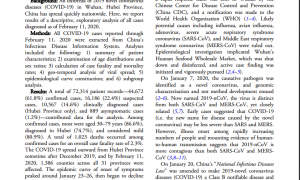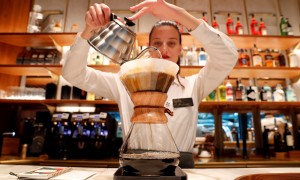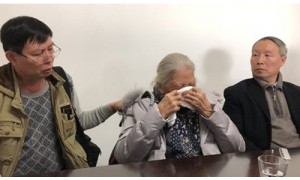导读:北京航空航天大学的研究生王娜娜和清华大学一年级研究生黄爽发明的手语识别臂环,为广大失语者解决了一大难题,很多网友纷纷为其点赞,称赞“少年强则国强”。
<img data-cke-saved-src="http://cms.iyuba.com/cms/news/image/55606.jpg" src="http://cms.iyuba.com/cms/news/image/55606.jpg" alt="“清华北航两名90后女生发明翻译臂环" _英语新闻"="">
After National Disabled Person’s Day on May 21, a video released by CCTV featuring two graduate students from Beihang University and Tsinghua University has gone viral online. Wang Nana and Huang Shuang, intent on helping their hearing-impaired friends, invented a wearable sign-language interpreter by transforming sign language into audible information. The pair won first prize last month in an open design challenge organized by the UN Development Program and tech giant Baidu.
继“全国助残日”过后,中央电视台发布的一则视频在5月21日前后迅速在网上流传起来。该视频的主人公是两位研究生——来自北京航空航天大学的王娜娜和来自清华大学的黄爽,两位同学为了帮助自己听力受损的朋友,研究发明了一种能将手语转换为语音的翻译臂环。与此同时,她们还于上个月在在联合国和百度公司共同举办的设计挑战大赛上凭借该发明夺得冠军。
Wang Nana started her research with a goal of helping the disabled rather than making a fortune. Her friend, Zhang Quan, could only use WeChat to communicate with her even when they were sitting face to face, as Wang did not know sign language. She felt sorry for Zhang when, surrounded by a chatting group, he could only remain silent.
事实上,王娜娜最初设计翻译臂环的初衷并非为了盈利,只是单纯想帮助那些在这方面有缺陷的残疾群体。王娜娜有一位聋人朋友叫张权,由于她自己不懂手语,平时即使两人坐在一起,张权也不得不用微信打字和她交流。特别当许多人一起聊天时,她更为身处无声世界的张权感到抱歉。
At the time, Wang was a computer science student studying image-based sign language recognition technology. However, she was too focused on technical details to consider the portability of an interpretation device. It was her close friend Huang Shuang who contributed the idea of creating something wearable.
当时,计算机专业的王娜娜正在研究基于图像的手势识别技术。然而,她本人将注意力过多放在考虑该翻译装置可携带性的相关技术细节之上,后来还是娜娜的好朋友黄爽提醒她可以尝试发明可佩带的装置。
The idea for a sign language armband was inspired by a device used by student musicians studying piano. Teachers can tell whether the muscles in a student’s arm are properly aligned through the use of special armbands. Wang and Huang decided to apply this technology to their device. They put each neuromuscular signal of sign language into a system, and then employed artificial intelligence to help the system recognize and "translate" the signs into audible information. In this way, people dependent on sign language to communicate can "speak" fluently with ordinary people.
后来,王娜娜了解到有一种专门用于学习钢琴的臂环,钢琴老师通过看肌肉的用力情况来判断学生的指法是否正确,这一装置恰好为王娜娜提供了灵感。随后,娜娜和黄爽两人便决定将该项技术运用到自己的新装置之上,她们将每个手语词汇的肌肉电信号录入系统,让人工智能深度学习,以便系统在下次遇见相应手语之后可进行识别和转化成语音。通过这种方式,那些依赖手语交流的群体今后将有可能做到和正常人一样流畅“对话”。







